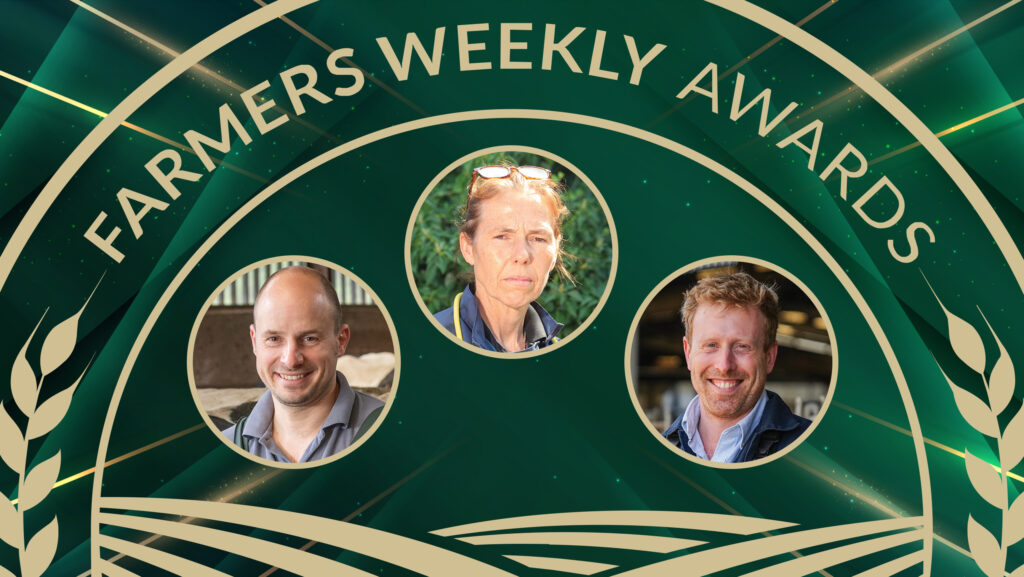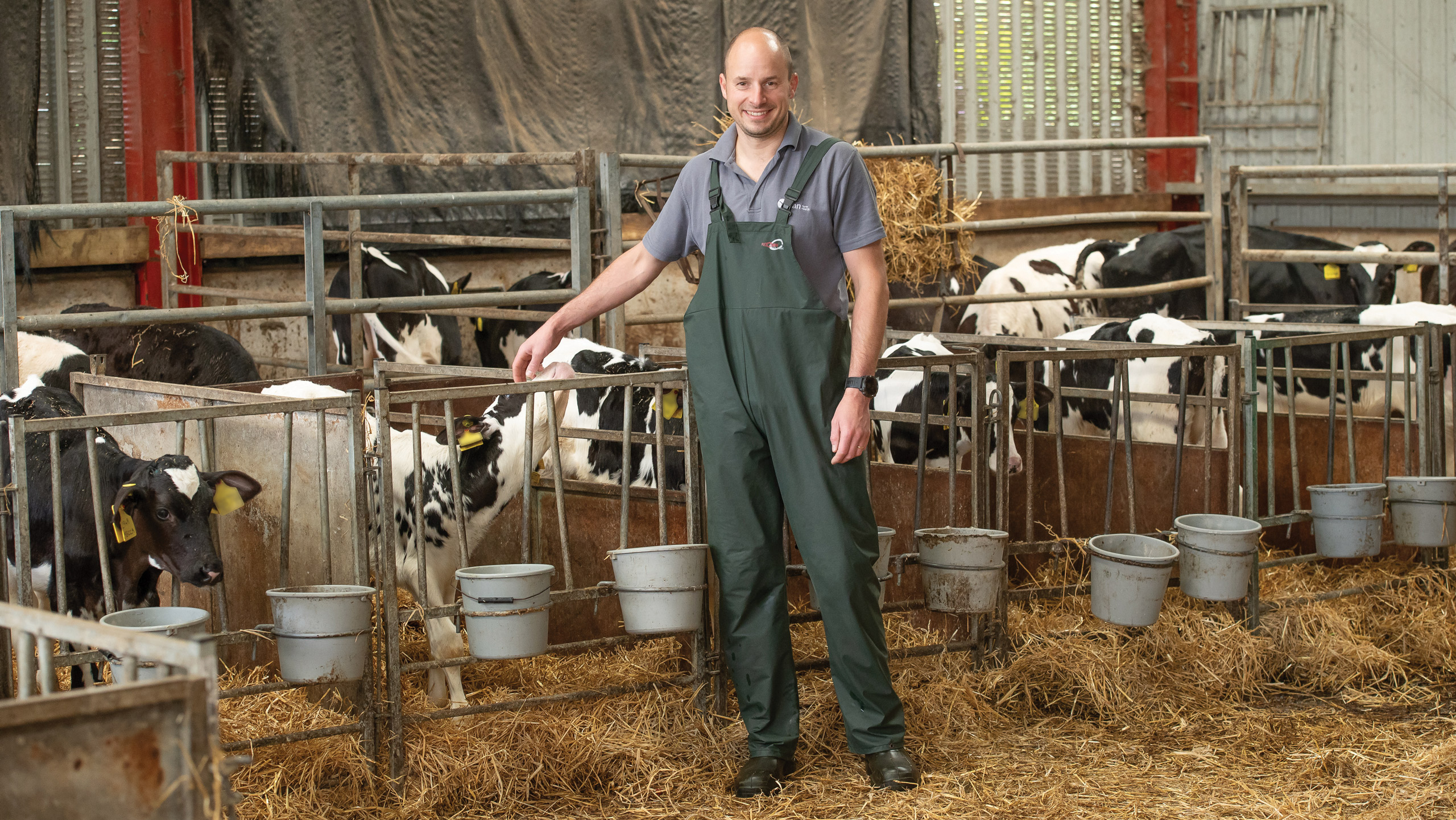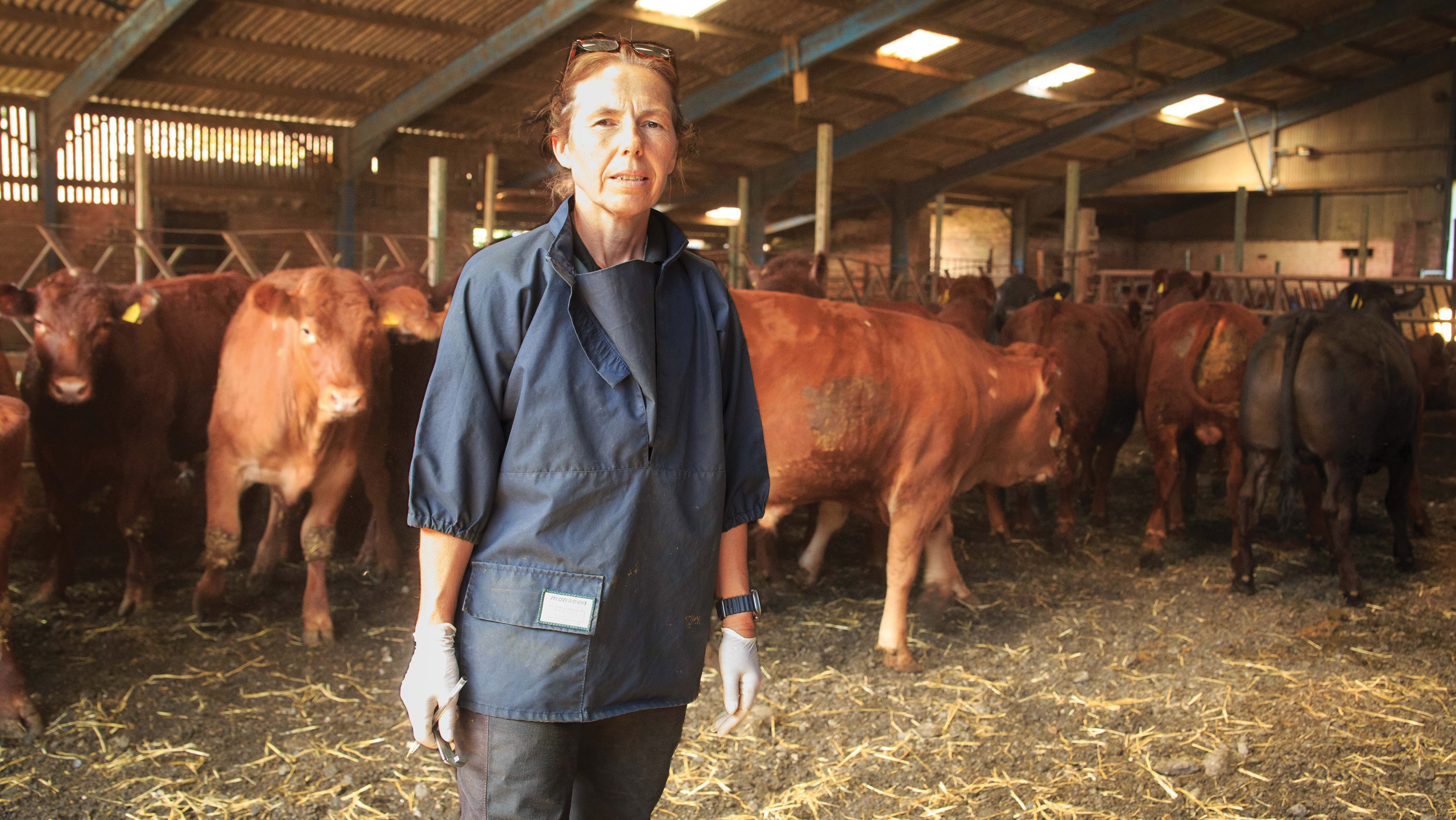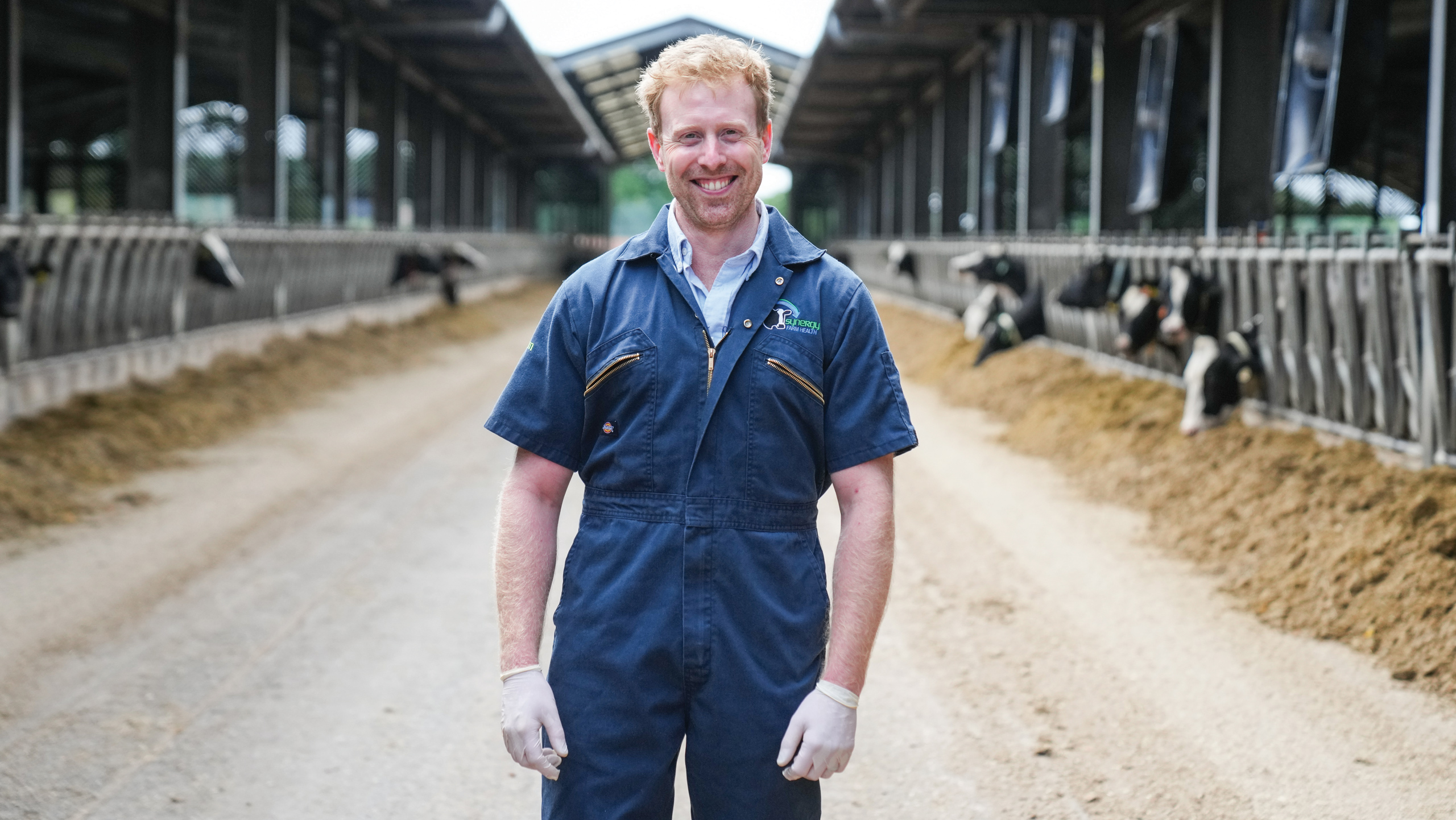FW Awards: Meet the 2025 Livestock Adviser of the Year finalists
 Left to right: Andrew Crutchley, Molly McKay, Peter O'Malley © John Eveson/Tim Scrivener/Emily Fleur
Left to right: Andrew Crutchley, Molly McKay, Peter O'Malley © John Eveson/Tim Scrivener/Emily Fleur Switching dairy breeds, rapid herd expansion and a laser-like focus on training are three key focus areas for this year’s finalists.
See also: FW Awards 2025: Meet the finalists
Finalists
- Andrew Crutchley, Yan Farm Health, Cumbria
- Molly McKay, Norfolk Farm vet group, Lincolnshire
- Peter O’Malley, Synergy Farm Health, Somerset
The judges
- Amy Mepham is the NFU’s dairy policy adviser. She has wide experience of working in the UK milk industry as well as farming abroad in Canada and Australia.
- Jonathan Crimes, last year’s winner, is a consultant with Cara Wales covering dairy, beef and sheep farming clients. He also farms near Lampeter.
- David Jones contributes to Farmers Weekly on a variety of topics covering both arable and livestock farming.
Andrew Crutchley, Yan Farm Health, Cumbria

© John Eveson
Andrew Crutchley has successfully given his veterinary advice on the doubling of a Cumbrian dairy herd in six months, bringing in nearly 400 new milking cows.
This involved introducing four new herds – with all the potential inherent disease risks that brings – to Patrick Morris-Eyton’s dairy unit.
The aim was to prevent serious losses in fertility and yields during a period of heightened stress levels for cows and staff.
Andrew and the farm team even managed to integrate one loose-housed Norfolk herd into the housed, cubicled system at Beckside Farm, where cows are milked three times a day.
There was concern about bringing in diseases such as TB and Johne’s, but the herd moves showed how resilient cows are, even after the stress from travelling and settling into a new management regime.
“Now the focus is on fertility, and the herd is moving back to the old very high level of fertility, and also on staff training with an emphasis on foot health,” says Andrew.
Technical knowledge
The Beckside Holstein herd was expanded from 400 to 780 cows in the six months to November 2024, and Andrew’s skill has managed to avoid any major problems.
With integration complete, annual milk yields are averaging 13,284 litres a cow, at 4.2% butterfat and 3.4% protein.
Milking is through a 54-point rotary parlour, and there are plans to grow the herd further.
Andrew was key to the rapid expansion, speaking to the vets of all the herds considered for purchase.
After careful evaluation, many of these were rejected on health grounds.
“We have seen a slight uptick in lameness and mastitis, and some weight loss from the understandable stress, but since the cows settled in, these areas are improving,” he says.
Environmental credentials
Andrew has seen a one-third reduction in antibiotics used across the 60 dairy clients covered by his vet group over the past two years.
He is looking at integrated parasite management to control stomach worms and is giving close attention to cow housing and infrastructure to reduce mastitis without always resorting to drugs.
Although the vet practice based near Kendal was only set up in February 2021 by Andrew and a business partner, it now has six vets.
Cow lameness has been cut across the practice as the vets work closely with foot trimmers.
Andrew advised on the introduction of rubber mats on Patrick’s farm where the cows turn to exit the rotary milking parlour, to put less stress on their feet.
Client relationship
Patrick says that Andrew, in the three years he has been the main vet on the farm, has been vital in the recent and future herd expansion plans.
“We want to be the best, we want to be best in class in everything, and so we need the best vet,” he adds.
When the herd expansion was decided, Patrick and others from the farm staff met regularly with Andrew to discuss the targets for the farm, such as milk yields and health status.
Andrew works with all 24 staff employed on the farm, and all new recruits sit down with him to go through the farm’s protocols on health.
The next stage of expansion is a maternity shed. Andrew has been instrumental in planning for individual calving pens, rather than straw yards, as the most hygienic options for cows and calves.
“For us, Andrew would be impossible to replace. There is nobody in the north of England at the same level,” says Patrick.
The numbers
- 16 years as a vet
- 4 years working at Yan Farm Health
- 150 farming clients
- 6 vets in the practice
- 3 counties covered – south Cumbria, North Yorkshire and north Lancashire
Farm facts – Beckside Farm, Whicham, Millom, Cumbria
- 480ha farm consisting of grassland and maize for silage
- 780 Holsteins housed year-round and milked three times a day
- Annual milk yield 13,284 litres a cow
- Breeding sheep flock of 150 New Zealand Highland ewes on hill land
The judges liked
- Forward-thinking, progressive and at the cutting edge of new veterinary thinking and knowledge
- Very good on training and knowledge transfer for his vet team and farmer clients
- Able to adapt rapidly to changes to fit in with his farming clients’ ambitions
What the judges say
Andrew is clearly at the top of his game with deep-rooted respect and trust for all his farming clients. He brings a level of expertise that is absolutely essential in a high-yielding, well-managed, modern dairy unit.
Molly McKay, Norfolk Farm vet group, Lincs

© Tim Scrivener
Lincolnshire vet Molly McKay has helped guide one large dairy unit, on the verge of giving up milk production, to switch breeds and move to a more sustainable model.
Molly advised Duguid Home Farm on its move towards Montbeliarde/Norwegian Red- cross cattle and away from Holstein Friesians.
Although milk production fell, so did input costs, while herd health and fertility both improved.
The previous year-round calving system produced 12,500 litres a cow on three-times-a-day milking.
The farm now has 480 milking cows and has moved to autumn calving and twice-daily milking, with annual yields at 8,500 litres a cow.
“What we are losing on yield, we are gaining on improved health with better fertility, and less footcare and mastitis,” says Molly.
The change of breed was reinforced by Molly’s infectious enthusiasm for prevention rather than cure, and her keenness to mentor fellow vets and farm staff to create a closely knit team, helping to boost milk production of the new herd and mental health on the farm.
Technical knowledge
Molly set up her current vet practice in 2006. She now has four female vets covering Lincolnshire and north Norfolk, and became key in Duguid Home Farm’s eventual decision to stay in dairying.
“The biggest challenge was fertility in the move towards block calving, and buying in new stock to fit into a tight calving pattern,” she says.
While the herd is easier to manage, the cows are starting to get too small for the infrastructure, such as cubicles and the parlour, so Holstein genetics are being used to push up size.
Molly is keen to keep yields at 8,500 litres-plus, while the tight calving pattern has had to be relaxed somewhat to provide continuity of supply – the farm sells raw milk to consumers and also milk for cheesemaking and ice cream.
She bases her monthly fees on litres of milk produced and points out that although milk output on the farm is relatively low, less vet time is needed on lower-input units.
Environmental credentials
Molly is strict on drug use, with no random wormers used and antibiotics use falling.
“Antibiotics use has come down by 30% in the past two years due to the switch in breed and simply being carefully about every aspect of management,” she says.
With milk supplied under a premium Arla 360 contract, which looks for cows grazing outside for a number of months, there is a focus on health and prevention.
Youngstock care has improved under Laura Carter, who leads the team caring for nearly 500 calves over the calving period, and who recently won a national calf rearer award.
Client relationship
Molly has worked closely with Duguid’s dairy management team, headed up by father-and-son team Dirk and Callum Simpson, since she started advising the farm nearly a decade ago.
“Molly is more than a vet, she is a friend and knows all the staff personally and is excellent at mentoring and training them,” says Dirk.
“She is an integral part of the team. I am not looking forward to her retiring. Molly is always the first port of call when there is a problem,” he adds.
Molly, however, is planning to retire in August 2026 and hand over to a current vet and administrator in the practice.
She will then stay on for a few more years as a consultant to smooth the handover of the running of the vet group.
The numbers
- 24 years as a vet
- 19 years since setting up Norfolk Farm practice
- 178 farming clients
- 4 vets working in practice
- 2 counties covered: Lincolnshire and north Norfolk
Farm facts – Duguid Home Farm, Bishop Norton, Market Rasen, Lincs
- 800ha-plus estate with arable and grassland
- 480 autumn-calving Montebeliarde-Norwegian Red-cross cows
- Annual milk yield 8,500 litres a cow
- Stock grazing grassland; silage made from grass and maize
The judges liked
- Clear focus on prevention rather than cure, transferred to Molly’s livestock farming clients
- Mentoring the next generation of vets, vet technicians, farmers and farm staff, with succession planning already done
- Closely knit vet team achieved using a collaborative and inclusive approach
What the judges say
Molly is very authentic and genuine about the welfare of her clients and livestock and does all she can do to make them run their businesses well. She is so much more than just a livestock adviser.
Peter O’Malley, Synergy Farm Health, Somerset

© Emily Fleur
Somerset vet Peter O’Malley’s clear focus on educating and training staff on one large intensive dairy unit has cut vet costs/litre of milk to a very competitive level.
The FAW Bakers business has 30 dairy staff employed on a 1,200ha estate.
The herd of 2,500 Holsteins is housed year-round and milked three times a day, with yields on an upward trend in a young herd.
Peter has set up 30 protocols, on areas such as maternity care and freshly calved cows.
This is so the staff, who are often recruited from non-farming roles such as chefs and mechanics, do not have to always call the vet.
“The farm’s biggest challenge is to grow the herd sustainably, and for that we need good staff recruitment, and the retention of the right staff,” says Peter.
Technical knowledge
With clear protocols to guide them, the staff are inspired to take more responsibility.
This has driven down the vet spend/litre of milk to a low of 0.92p/litre, while many other farms spend more than 1p/litre.
Peter has been working with the Bakers’ farm near Crewkerne since 2019 and as the farm’s primary vet since 2021.
His presence has led to more healthy cows and increasing milk yields.
His approach for potentially deadly toxic mastitis, for example, is that affected cows do not need antibiotics.
Rather, they need plenty of fluids, their milk is immediately stripped out and anti-inflammatories are used.
Monitoring ear tags can warn of early signs of toxic mastitis, then staff check if the suspect cow is off-colour and appearing “slightly drunk”. If so, the cow can be quickly treated.
Good footcare has seen lameness down to 6% of the herd, while thoracic lung scanning has seen clinical pneumonia of calves drop below 5%. No antibiotics are used when drying off milking cows.
Environmental credentials
The farm has seen antibiotics use cut by 22% in the past two years, while maintaining high milk production and with low disease levels.
“The Bakers have a sustainable farming model with disease levels incredibly low, and this saves carbon due to the very efficient production,” says Peter.
About 45% of the milking herd is in its first lactation in a rapid expansion strategy, which accounts for the relatively modest average annual yield of 11,000 litres a cow – albeit on a rapidly-rising trend – at 4.5% butterfat and 3.5% protein.
Peter’s enthusiasm for education has extended to training future farm vets through his work with the Royal Veterinary College in London.
Client relationship
The Bakers’ operation is run by Neil, his daughter, Rhian, and his two sons, Jamie and Scott.
Peter has also been key in planning the family succession within the business.
“Since he became our main vet in 2021, Peter has helped with the smooth transition of the day-to-day operation of the family business,” says Rhian.
Peter’s approach is data-driven, and this has helped the younger generation of the family take a bigger role in the business and bring in new recruits.
“Training is very important to us as we are recruiting from outside farming, and Peter has been useful in terms of basic training and then leading to more technical skilled training,” says Jamie.
The farm’s aim is to get the most out of the cows on the farm, and Peter is key in this process of increasing yields from healthy cows, he adds.
The numbers
- 14 years working as a vet
- 6 years with Synergy Farm Health
- 59 vets in the vet practice
- 289 dairy clients
- 5 counties covered: Devon, Dorset, Somerset, Hampshire, Wiltshire
Farm facts – FAW Bakers, Haselbury Plucknett, Crewkerne, Somerset
- 1,200ha farmed, with grassland, maize and wheat used to feed the milking herd
- 2,500 Holsteins milked three times a day through an 80-point rotary parlour
- Annual yield 11,000 litres a cow
- RABDF Gold Cup winner 2015 and FW Dairy Farmer of the Year 2010
The judges liked
- Peter’s enthusiasm and passion for the livestock industry and his veterinary work
- Use of data to ensure evidence-based decisions are made on farm to make effective changes
- Creation of online training programme for education and training of farm staff and young vets
What the judges say
Peter’s infectious energy and his enthusiasm for whatever he does, to the advantage of farmers, staff and young vets, is plain to see. He is an essential factor in the success of his dairy farming clients.
